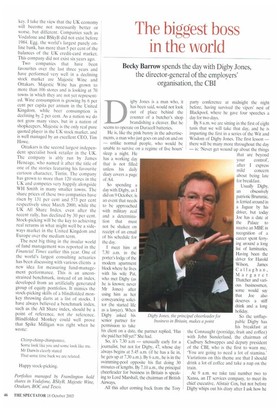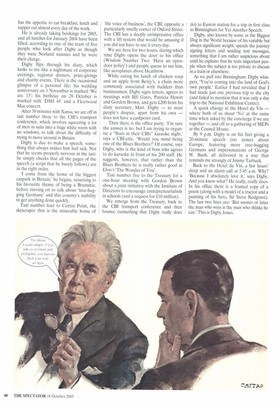The biggest boss in the world
Becky Barrow spends the day with Digby Jones, the director-general of the employers' organisation, the CBI Digby Jones is a man who, it has been said, would not look out of place behind the counter of a butcher's shop brandishing a cleaver. But he seems to operate on Duracell batteries.
He is, like the pink bunny in the advertisements, a man who just goes on and on and on — unlike normal people, who would be unable to survive on a regime of five hours' sleep a night. He has a working day that is not filled unless his daily diary covers a page of A4.
So spending a day with Digby, as I did on 9 October, is an event that needs to be approached with military zeal and a determination that must not be shaken on receipt of an email of his schedule for the day.
I meet him at 7.30 a.m. in the porter's lodge of the modem apartment block where he lives with his wife Pat, who met Digby (as he is known; never Mr Jones) after using him as her conveyancing solicitor (he started life as a lawyer). When Digby asked his senior partner for permission to take his client on a date, the partner replied, 'Has she paid her bill yet?' She had.
So, it's 7.30 a.m — unusually early for a journalist, but not for Digby, 47, whose day always begins at 5.45 a.m. (if he has a lie in, he gets up at 7.30 a.m.). By 6 a.m., he is in the swimming-pool opposite his flat doing 30 minutes of lengths. By 7.10 a.m., the principal cheerleader for business in Britain is speaking to Lord Marshall, the chairman of British Airways.
All this after coming back from the Tory party conference at midnight the night before, having survived the vipers' nest of Blackpool, where he gave four speeches a day for two days.
By 8 a.m. we are sitting in the first of eight taxis that we will take that day, and he is imparting the first in a series of the Wit and Wisdom of Digby Jones. The first lesson — there will be many more throughout the day — is: 'Never get wound up about the things that arc beyond your control'. after I express mild concern about being late for breakfast. Usually Digby, an obsessively patriotic Brummie, is ferried around in a Jaguar by his driver, but today Joe has a date at the Palace to receive an MBE in recognition of a career spent ferrying around a long list of luminaries. Having been the driver for Harold Wilson, James Callaghan, Margaret Thatcher and various businessmen, some would say that Joe also deserves a stiff drink and a long holiday.
So the unflappable Digby has his breakfast at the Connaught (porridge, fruit and coffee) with John Sunderland, the chairman of Cadbury Schweppes and deputy president of the CBI, who is the first to warn me, 'You are going to need a lot of stamina.' Variations on this theme are that I should drink a lot of coffee and take a nap on the train.
At 9 a.m. we take taxi number two to Xansa, an IT services company, to meet its chief executive, Alistair Cox, but not before Digby whips out his diary after I ask how he has the appetite to eat breakfast, lunch and supper out almost every day of the week.
He is already taking bookings for 2005, and all lunches for January 2004 have been filled, according to one of the team of five people who look after Digby as though they were Norland nannies and he were their charge.
Digby flips through his diary, which looks to me like a nightmare of corporate evenings, regional dinners, prize-givings and charity events. There is the occasional glimpse of a personal life: his wedding anniversary on 1 November is marked 'We are 13'; his birthday on 28 October is marked with `DMJ 48' and a Fleetwood Mac concert.
After 30 minutes with Xansa, we are off in taxi number three to the CBI's transport conference, which involves squeezing a lot of men in suits into a huge white room with no windows, to talk about the difficulty of trying to move around in Britain.
Digby is due to make a speech, something that always makes him feel sick. Not that he seems properly nervous in the taxi: he simply checks that all the pages of the speech (a script that he barely follows) are in the right order.
'I come from the home of the biggest carpark in Britain,' he begins, returning to his favourite theme of being a Brununie, before moving on to talk about 'tree-hugging Germany' and this country's inability to get anything done quickly.
Taxi number four to Centre Point, the skyscraper that is the miserable home of 'the voice of business', the CBI, opposite a particularly smelly corner of Oxford Street. The CBI has a deeply unimpressive office with a lift system that would be amusing if you did not have to use it every day.
We are here for two hours, during which time Digby opens the door to his office (Wisdom Number Two: 'Have an opendoor policy') and people queue to see him, like aeroplanes above Heathrow.
While eating his lunch of chicken soup and an apple from Benjy's, a chain more commonly associated with builders than businessmen, Digby signs letters, agrees to meetings with Bill Gates, Patricia Hewitt and Gordon Brown, and gets £200 from his diary secretary, Matt. Digby — to most people's despair, apart from his own — does not have a cashpoint card.
Then there is the office party. 'I'm sure the answer is no, but I am trying to organise a "Stars in their CBIs" karaoke night,' says a CBI-ette. 'Would you mind being one of the Blues Brothers?' Of course, says Digby, who is the kind of boss who agrees to do karaoke in front of his 200 staff. He suggests, however, that rather than the Blues Brothers he is really rather good at Elvis's 'The Wonder of You'.
Taxi number five to the Treasury for a one-hour meeting with Gordon Brown about a joint initiative with the Institute of Directors to encourage entrepreneurialism in schools (and a request for f10 million).
We emerge from the Treasury, back to the CBI transport conference and then bounce (something that Digby really does do) to Euston station for a trip in first class to Birmingham for Yet Another Speech.
Digby, also known by some as the Biggest Dog in the World because of his variable but always significant weight, spends the journey signing letters and sending text messages, something that I am rather suspicious about until he explains that he texts important people when the subject is too private to discuss in a train or elsewhere.
As we pull into Birmingham. Digby whispers, 'You're coming into the land of God's own people.' Earlier I had revealed that I had made just one previous trip to the city (and failed to mention that it was only a day trip to the National Exhibition Centre).
A quick change at the Hotel du Vin — where both of us shout 'No' at the same time when asked by the concierge if we are together — and off to a gathering of MEPs at the Council House.
By 9 p.m. Digby is on his feet giving a 20-minute speech (no notes) about Europe, featuring more tree-hugging Germans and impersonations of George W. Bush, all delivered in a way that reminds me strongly of Jimmy Tarbuck.
Back to the Hotel du Vin, a few hours' sleep and an alarm call at 5.45 a.m. Why? 'Because I absolutely love it,' says Digby. And you know what? He really, really does. In his office there is a framed copy of a poem (along with a model of a tractor and a painting of his hero, Sir Steve Redgrave). The last two lines are: 'But sooner or later the man who wins is the man who thinks he can.' This is Digby Jones.



































































































 Previous page
Previous page